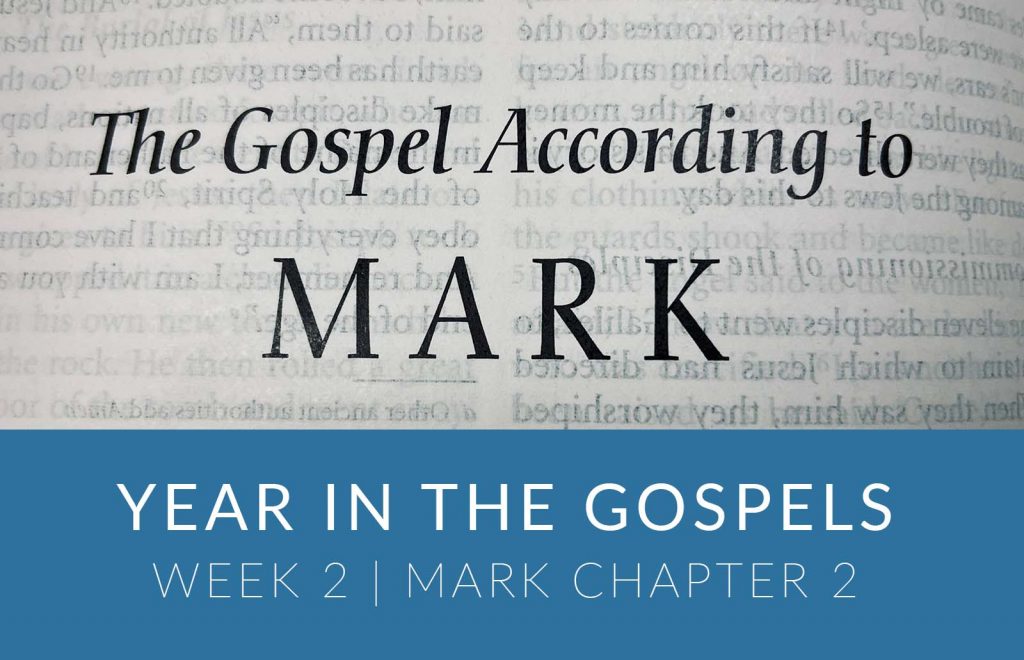Today's reading is from Mark 2:13-17. Click here to see a list of each day's readings for the Week 2. Each day's segments of the readings will be posted on this site during the week.
Today's Reading
Jesus went out again by the sea. The whole crowd came to him, and he taught them. As he went along, he saw Levi, the son of Alphaeus, sitting at the tax booth. “Follow me,” he said to him. And he got up and followed him. As Jesus was having a meal in Levi’s home, many tax collectors and sinners were eating with Jesus and his disciples, for there were many who followed him. When the experts in the law and the Pharisees saw that he was eating with sinners and tax collectors, they said to his disciples, “Why does he eat with tax collectors and sinners?” When Jesus heard this he said to them, “Those who are healthy don’t need a physician, but those who are sick do. I have not come to call the righteous, but sinners.” (Mark 2:13–17 NET)
The previous translation is from the NET Bible translation. Scripture quoted by permission. Quotations designated (NET) are from the NET Bible® copyright ©1996, 2019 by Biblical Studies Press, L.L.C. All rights reserved.
Further Resources For this Reading
Back in the first chapter Jesus heals Simon’s mother-in-law. I hadn’t thought about the disciples having wives and families. It makes it even more amazing that they would just drop everything and follow Him.
Two thoughts from the Pillar Commentary on Mark that I thought were great. It is clear that one of the things that the Kingdom of God is defined as, in the life of Jesus, is an upside down understanding of God's favor, acceptance, and what is considered clean. We've already seen Jesus cleanse the unclean (leper among others) but I thought that this word was fantastic as far as those who Jesus spent time with:
"It may be that contact with Levi was actually more offensive than contact with a leper since a leper’s condition was not chosen whereas a tax collector’s was" - James Edwards
In addition to this, from the same scholar, this is an important reminder from the Gospels:
"Jesus joins Levi for dinner at his house where there are “many tax collectors and ‘sinners,’” signifying that the call of a sinner is not an exception to his mission but typical of it."
If this is what the Kingdom of God looks like, am I mirroring that in my own life? Are we accepting or rejecting of those who, in our opinion, do or don't belong in the conversation of favored?
Jay, and Judy…I had not connected with Simon being married before Carol and I started watching the crowd-funded series called “the Chosen”. It’s all about Jesus choosing His disciples. One episode in season 1 showed that whole story of Simon’s wife and mother-in-law.it really brought the story to life! Beautiful how it could have been.
Tax collectors were really tax contractors (sometimes called "tax farmers"). In the system of the Roman empire, everyone owed something to those above them. Client kings or rulers owed monies and supplies to the Emperor, and those who were under the client kings were expected to supply these to the client king. Tax collectors would make bids in this regard ('If I'm the tax collector, I promise I can give you X funds/resources from this region.'). If awarded the contract, they had to pay up front. Though there were laws and regulations on how much taxation could take place, once the contract was won and the up-front commitment paid, tax collectors often ran up the rates, as anything above what they paid in the contract was their own profit. They also often used threats, extortion, and violence to get the tax levels they needed and desired (think something like the mafia). With the higher rates, tax collectors were seen as greedy money-lovers profiting at their own neighbors' expense, made worse in that they were middle-men for foreign rulers.
If his name is an indication, Levi was likely from the Levites. If this is the case, he has betrayed his role as someone who was supposed to help the priests mediate for the people with God, and instead became a mediator for his own gain and for foreign rulers.
Regarding the payment to Empire: Pontius Pilate's first role/title was Procurator of Judea. This meant that his main job was to procure the taxed resources in Judea (the area of Jerusalem and the Mediterranean coast). The whole purpose of conquering a people or a region was to take their resources for Rome. Matthew likely paid his contact to Herod Antipas, who at the time was the client king representing Galilee to Rome and procuring its resources.
I love Jay’s comment of the question, do we accept or reject (judge) certain people, because, in our opinion, their “lifestyle” is contrary to our faith teachings? (Sounds like the current conversations in the Methodist church.)
Here are two resources for today's reading for further context and insight:
This is a post that discusses what a first-century meal might have been like as Jesus was 'lying-around', eating with sinners and tax-collectors.
The other contains the parallel readings from the other gospels related to this story.
Hope they are helpful!
The key for me to remember is that I am a sinner. I think that's what the scribes also missed.
